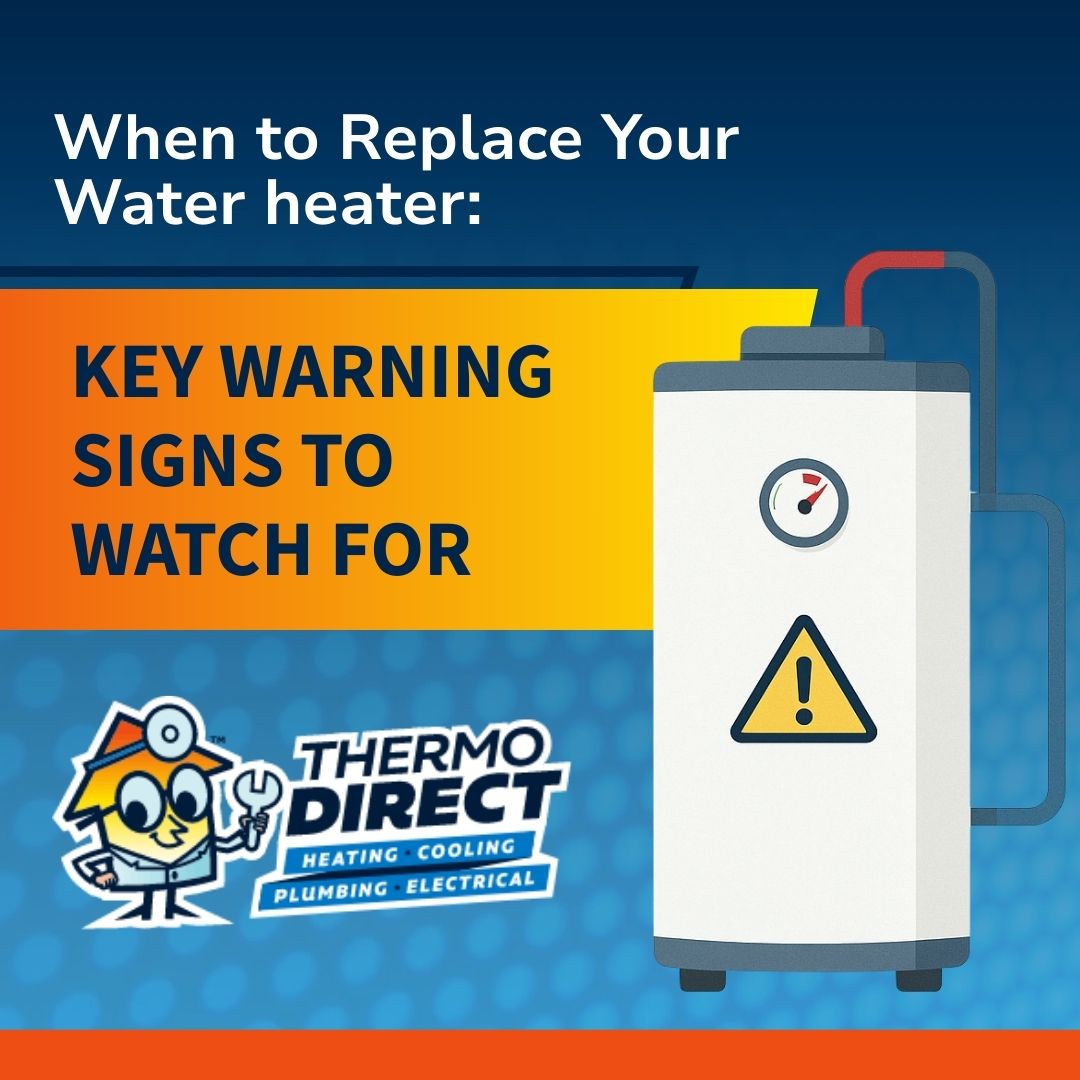Quick Summary
- Little to no hot water, strange noises, discoloration, and visible leaks are some of the top signs your water heater is due for replacement.
- While repairs are suitable for new units with relatively minor issues, replacement is best for heaters over 10 years old with severe wear and tear.
- Hiring a professional plumber for replacement ensures a safe installation that meets local codes, maximizes efficiency, and provides reliable hot water for years to come.
How To Know if Your Water Heater Needs To Be Replaced
Cold showers, inconsistent temperatures, and constant repairs are a few common signs that something isn’t quite right with your water heater. While repairs are a quick fix for some minor problems, others require a complete system replacement to fully restore reliable hot water to your taps.
This water heater replacement guide outlines the top signs that your water heater’s lifespan is nearing its end. Discover how to choose a new unit that meets your household’s needs and the advantages of professional water heater replacement by Thermo Direct.
Top Warning Signs Your Water Heater Is Failing
When your water heater begins to fail, it’ll show clear signs that something’s not right. From chilly taps to visible leaks, discover the top signs you need a new water heater.
Inconsistent or no hot water
If your water heater is constantly running out or not supplying any hot water at all, there’s likely an issue preventing it from operating correctly. Sediment buildup, dip tube failure, and heating element malfunctions can cause your system to struggle to supply your home with hot water and maintain a consistent temperature.
Strange noises from the tank
Banging, popping, and sizzling noises are often a sign of serious issues within your unit. Failing heating elements, pressure buildup, and sediment accumulation can cause these strange sounds and signal the need for replacement.
Rusty or discolored water
If you turn on your taps to find red or brown-colored water pouring out, internal corrosion or sediment buildup is likely causing discoloration. These problems can also cause rotten egg-like smells or a metallic taste.
Leaks or pooling water around the unit
Cracks, leaks, or corrosion can cause water to leak out of your unit and pool around the tank. Without repair or replacement, these leaks can progress and eventually lead to severe water damage or tank bursts.
Higher energy bills without increased usage
If your bills are continuously rising even though you’re not using more water than usual, sediment buildup or component failure is likely forcing your water heater to work harder than it should. Your energy bills climb as your unit uses excess energy to heat water.
Repair vs. Replace — Which Is Right for You?
When something goes wrong with your unit, you may wonder what type of water heater service is required. The age, condition, and efficiency of your unit can help you decide between repair and replacement.
When a repair might be enough
If your water heater is under 10 years old and in relatively good condition, repairs are often sufficient to restore proper function. Simple fixes, such as replacing a faulty thermostat or heating element, are easy to resolve without the need for a complete replacement.
When replacement is the smarter choice
If your water heater is nearing the end of its lifespan, severely damaged, or unable to keep up with the demands of your household, replacement is often the best solution. Installing a new, high-efficiency unit helps deliver reliable hot water while reducing the risk of costly repairs and future breakdowns.
Choosing the Right Replacement Water Heater
When upgrading your water heater, choosing the right model helps maximize your home comfort, efficiency, and long-term value. Discover your sizing, design, and efficiency options below to determine which water heater is right for your home.
Tank vs. tankless options
Water heaters come in two main styles — tank and tankless. Traditional tank water heaters are more affordable and store a set amount of hot water. Tankless styles often come with a higher upfront cost, but deliver on-demand hot water so you always have a continuous supply.
Correct sizing for your home
Choosing the right size water heater helps ensure you have enough hot water for your daily needs while minimizing energy waste. A unit that’s too small won’t be able to keep up with your hot water usage, while one that’s too large uses excess energy and increases your utility bills.
Energy-efficient models
Upgrading to a smart, high-efficiency water heater helps reduce your monthly utility costs and carbon footprint. Always look for ENERGY STAR® approved models, which meet strict efficiency standards and can even qualify you for rebates and tax incentives.
Benefits of Professional Installation
When it comes time to replace your water heater, always contact a trusted plumber in your area. Professional installation is key to correct sizing, proper setup, and efficient operation.
A licensed plumber can assess your home, budget, and usage to find the right unit for your needs, and safely install it for long-term reliability. They’ll also handle any necessary permitting, make sure the installation is up to local codes, and inform you of any rebates or tax incentives you qualify for.
Thermo Direct offers flexible financing options to help you save on water heater replacements. With an easy payment plan, you won’t have to worry about the financial stress of making an upgrade. Don’t forget to ask about our seasonal promotions and special offers that help you save on water heater services.
Service Areas in and Around Raleigh, NC
At Thermo Direct, we proudly offer water heater services throughout Raleigh, Holly Springs, and surrounding areas, including the following area codes:
- 27601
- 27603
- 27604
- 27605
- 27606
- 27607
- 27608
- 27609
- 27610
- 27612
- 27613
- 27614
- 27615
- 27616
- 27617
- 27695
Call the Raleigh Water Heater Experts Today
If your water heater is showing signs of failure, we’ll inspect your system to identify the underlying issue and walk you through your repair and replacement options. Whether you’re dealing with broken components, excess strain, or a unit nearing the end of its lifespan, we’ll help you find a quick and effective solution that provides reliable hot water for years to come. Contact us to schedule your appointment today!
Frequently Asked Questions
How long should a water heater last before needing replacement?
Most traditional tank water heaters last between eight and 12 years, while tankless models can last up to 20 years before requiring replacement. Routine professional maintenance and prompt repairs help extend the lifespan of your unit and reduce the risk of early breakdown.
When is the best time of year to replace a water heater?
Spring and early summer are the most ideal times to replace your water heater. The demand for hot water is lower during these months, so you’ll often find easier scheduling and lower replacement rates. Replacing your unit and preparing your plumbing before fall and winter arrive also ensures your home is ready for the chilly months ahead.
What size water heater do I need if I’m replacing mine?
The right size water heater for your home depends on the number of people in your household, your average daily hot water usage, and the type and number of appliances you use regularly. Before installing a new unit, our plumbers will evaluate your home to help you select the best unit for your needs.










